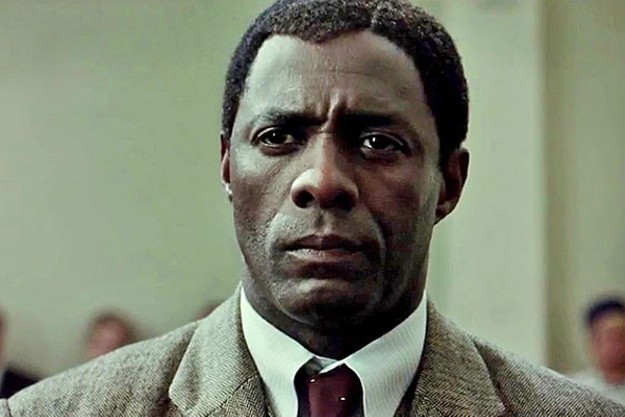Biopics are tricky things – done badly, they are either the cinematic equivalent of self-help books, done well they become a story all of their own, which nevertheless, will never please everyone.
Think Frida. Elizabeth and now add Mandela: Long Walk to Freedom to that list. It’s only one of a recent slew of movies to fictionalize the Mandela story, and one which, deliberately or not, will ride the wave of interest following his passing.

Idris Elba as Mandela in Mandela: Long Walk to Freedom
Perhaps given the hugely complex and long drama of 20th struggle against Apartheid, Long Walk to Freedom can be declared a success merely for its brevity, if nothing else. Justin Chadwick, the screenwriter, (who was also the name behind the famous apartheid-era film Sarafina) is unapologetic about the fact the film omits much – to say the omissions are glaring would be an understatement.
There is little sense of the monumental oppression that defined the experience of black South Africans, or the ideological ferment that characterized their response to it. Perhaps the film-makers feared a nuanced approach to the story?
Despite all this, what shines through the movie though are the performances of the two leads, Idris Elba, as Mandela, and Naomie Harris as Winnie Mandela. Chadwick has placed their love story center-stage in his script; using their loss of political innocence as a cautionary tale in Winnie’s case, and a redemptive one in Mandela’s.
The characterization of Winnie Mandela is hardly fair, but the story does acknowledge her importance, in many ways, playing a militant foil to Mandela’s pacifist hero; what the film barely hints at of course, is that Madikizela-Mandela’s politics mirrored very closely those of the streets from which she drew sustenance to survive the assaults of the apartheid state. Apparently, Winnie Mandela herself has expressed satisfaction with the way she is portrayed in the film, though to be fair the past examples this may be based on are hardly anything to write home about.
The driving force of the film is what feels like Mandela’s (inevitable – in the film) elevation from flawed man to political actor, to sanctified hero. The portrayal of Mandela’s relationship with his first wife Evelyn Mase leaves pause for thought; in one scene, the film comes close to suggesting there was physical abuse in the relationship. It’s an allegation Evelyn Mase herself apparently made, but which Mandela strongly repudiated. Many will feel it’s an undignified representation of a man who has come to loom large in the world’s imagination as a moral giant, but perhaps this makes it all the more important.
On occasion, this movie’s Mandela seems to be a moralizing prig – when he cautions Winnie Mandela for some of her political actions, or when he chastises his grand-children for insulting two of his guards with racial epithets; on the other hand, Mandela’s willingness to lead and be to some degree, unpopular but respected by his followers is captured perfectly.
The most powerful scenes of the film are those real-life incidents which have already entered into iconic global memory; Mandela reading his statement of defiance, Winnie Mandela’s dignified entrance to the court-house, the Mandelas triumphant emergence from prison in 1990, and their daughter, Zindzi Mandela reading her father’s refusal of South African Prime Minister Botha’s offer of conditional release.

Long Walk to Freedom is a good film – as biopics go but a proper history of South Africa’s struggle it is not Don’t expect much if you know even a little more than average about South Africa and Mandela.
For me, the story that emerges is Winnie Mandela’s triumphant, even slightly mischievous spirit.
One hopes that this is not the last film about Mandela or indeed all the dramatis personae of the anti-apartheid struggle.
I’m waiting for someone to make a film, or perhaps a TV series that can display the whole rich tableau of the anti-apartheid story in the 21st century, from the oppression of the 1900s, to the 1913 land act, and the emergence of the African National Congress, and ultimately the dismantling of the political edifice of Apartheid. Now that is something I would pay to see.
Dele Meiji Fatunla
Follow @delemeiji on twitter

